An illusory world is not enough: understanding how brazilian territory is constructed
DOI:
https://doi.org/10.22409/rep.v4i8.40317Palavras-chave:
Brazilian territory, João Marcelo Ehlert MaiaResumo
João Marcelo Ehlert Maia is a lecturer in Sociology at the Upper School of Social Sciences at the Center for Research and Documentation of Modern Brazilian History at the Getúlio Vargas Foundation (Cpdoc-FGV), Rio de Janeiro. It was within the precincts of this institution that the research was conducted that led to the origins of the book Estado, território e imaginação espacial [The State, territory and spatial imagination]. O caso da Fundação Brasil Central [The case of the Central Brazilian Foundation is based on a subject that is kept strictly within the parameters of its inquiries into the relationship between the geographical category ¨space¨ and Brazilian social thought. In reality, the outcome is a continuation of the thesis published in 2008 – A terra como invenção [The land as invention] – in which there is an analysis of both the concept of space during the First Republic and the importance of this category in the interpretation of the country conducted by important intellectuals like Euclides de Cunha and Vicente Licínio Cardoso. By referring to the archives of João Alberto Lins de Barros, which were donated to Cpdoc in 1997, in his new book Maia discusses the relationship between the construction of spatial illusion and the practices of the State in its territory, which are crystallized in the projects carried out by the Central Brazil Foundation (FBC).Downloads
Downloads
Publicado
Edição
Seção
Licença
Para submeter um manuscrito, os autores devem realizar o cadastro na plataforma, fornecer os dados solicitados e seguir as orientações recomendadas. Para tanto, será necessário apresentar o número da identidade de pesquisador. Para obtê-lo, é necessário realizar o cadastro na plataforma Open Researcher and Contributor ID (ORCID).
Ao submeter um manuscrito, os autores declaram sua propriedade intelectual sobre o texto e se comprometem com todas as práticas legais relativas à autoria. A submissão implica, ainda, na autorização plena, irrevogável e gratuita de sua publicação na REP, a qual se responsabiliza pela menção da autoria.
A REP tem acesso aberto e não cobra pelo acesso aos artigos.
Orientando-se pelo princípio de que tornar público e disponibilizar gratuitamente o conhecimento científico contribui para a democratização mundial do conhecimento, a REP adota a política de acesso livre e imediato ao seu conteúdo.
No mesmo sentido, a REP utiliza a licença CC-BY, Creative Commons, a qual autoriza que terceiros distribuam, remixem, adaptem e criem a partir do trabalho, inclusive para fins comerciais, desde que se reconheça e torne público o crédito da criação original.
Para mais informações, contatar a editora através do e-mail revistaestudospoliticos@gmail.com


